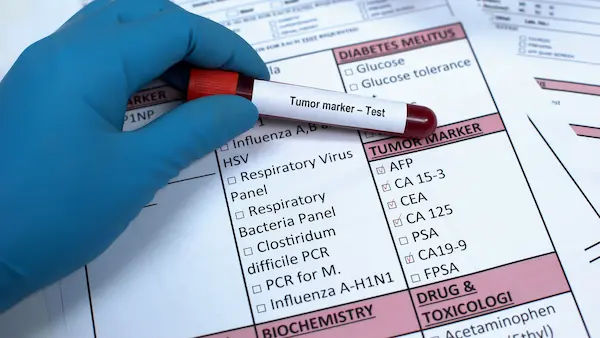How Cancer Marker Blood Tests Help Monitor Remission and Relapse?
Cancer marker blood tests play a vital role in tracking remission and detecting relapse early. Discover how these tests work, what they measure, and why ongoing monitoring is essential post-treatment.

Written by Dr. Rohinipriyanka Pondugula
Reviewed by Dr. Shaik Abdul Kalam MD (Physician)
Last updated on 7th Aug, 2025

Staying aware and alert after cancer treatment is crucial for cancer survivors, their family members, and caregivers. Cancer marker monitoring through blood tests offers a practical way to track remission and detect potential relapse early. These tests help in measuring specific biomarkers in the blood, acting as a cancer recurrence test to identify any signs of the disease returning. One of the most essential aspects of post-treatment care is cancer marker monitoring. Thus, survivors need to opt for regular monitoring to empower themselves with peace of mind and actionable insights.
The process involves regular blood tests to help detect tumour markers, biological substances that are released by cancer cells. These help in determining if the disease is in remission or showing signs of relapse. By focusing on post-treatment follow-up, these tests can also provide a proactive approach to managing health.
Why Monitor Markers after Cancer Treatment?
One of the most critical steps in post-treatment care is monitoring tumour markers in many types of cancer. These tests serve as a sensitive barometer, helping doctors track how a patient is doing after therapy, while also providing early warning signs of recurrence.
Below are a few key reasons for ongoing cancer marker monitoring:
- Detecting Early Relapse: Even before symptoms appear or imaging detects changes, a rising marker level can signal a return of cancer, known as a recurrence. This may guide timely interventions.
- Tracking Remission: After the cancer is treated successfully, tumour markers can significantly drop or become undetectable. It is essential to keep track of these levels as they can help in confirming if the disease is inactive.
- Assessing Treatment Success: For cancers with identifiable markers, for e.g. PSA for prostate cancer or CA-125 for ovarian cancer, the reduction in marker levels can serve as evidence of treatment efficacy.
- Guiding Surveillance Plans: Oncologists, based on marker trends, can tailor follow-up schedules, imaging needs or even consider preventative treatment steps.
Together, these reasons highlight why cancer marker monitoring goes beyond being just a routine, and rises as a proactive step.
What are the Key Tests Used during Remission?
Depending on the type of cancer an individual has had, several blood tests are available for cancer marker monitoring. These tests may vary in their specificity and usefulness.
Below are a few commonly used cancer marker tests in remission monitoring:
Prostate-Specific Antigen (PSA)
Book Prostate-Specific Antigen (PSA)
For survivors of prostate cancer, PSA is perhaps the most reliable marker. It is used for monitoring recurrence long after surgery or radiation therapy.
CA-125 (Cancer Antigen 125)
this is often used in ovarian cancer follow-up. Higher CA-125 levels may indicate the return of disease, especially when correlated with other symptoms or scans.
CEA (Carcinoembryonic Antigen)
Book CEA (Carcinoembryonic Antigen)
This may be used for colorectal and other gastrointestinal cancers. Rising CEA levels post-surgery or chemotherapy may indicate the return of cancer.
AFP (Alpha-Fetoprotein)
This may be useful in liver cancer and some testicular cancers. It can help in identifying recurrence or residual cancer tissue.
HER2/neu and CA15-3/CA 27-29
This is common in breast cancer monitoring. These markers can help oncologists gauge if cancer is likely to return or remain dormant.
Thyroglobulin (Tg)
It is essential in monitoring patients with thyroid cancer, especially after thyroid removal surgery.
It is important to note here that not all cancers have reliable markers. Marker use must be guided by medical history, cancer type, and recommendations by the treating oncologist.
Understanding Results of Cancer Marker Test
It is critical to remember that marker levels are not definitive in isolation. Still, they must be interpreted in the context of their entire clinical picture, including symptoms, scans and medical history.
Below are a few key considerations when interpreting results:
Fluctuations
Marker level fluctuations can be common due to non-cancerous factors such as infections, inflammation, or medication. One elevated result can rarely mean anything more serious.
Different Baseline Marker Level
Every person may have a different baseline marker level. The doctor, post-treatment, may monitor how patients’ levels compare to their new “normal.”
Importance of Trend
Trend is more important than a single reading. A steady upward trend across multiple tests may indicate recurrence, whereas an isolated rise often doesn’t.
False Positives
Not all rising markers may mean cancer has returned, and not all relapses show elevated markers. It is essential to combine marker monitoring with imaging and clinical exams.
It is crucial always to consult an oncologist to understand what a particular marker level means for them. One must ensure not to self-interpret these tests without proper guidance.
What are the Signs of Cancer Recurrence?
It is essential to note here that though tumour markers play a significant role in monitoring remission, they are only a part of the process. Being aware of the signs of recurrence can help survivors and caregivers empower themselves to seek timely advice.
Here are common physical and clinical signs of recurrence:
- Unexplained Weight Loss or Fatigue: This could indicate metabolic activity associated with tumour growth.
- Urinary or Digestive Changes: Recurrence in abdominal organs could lead to bloating, diarrhoea, constipation, or changes in urination.
- Persistent or New Pain: This could be felt, especially in the same region where the original tumour was located.
- Swelling or Lumps: New growths could happen, particularly near surgical scars or lymph nodes.
- Cough or Breathlessness: This could be felt, particularly if cancer had previously affected the lungs or metastasised there.
- Elevated Tumour Marker Levels: Sharp or sustained elevation of tumour marker levels may warrant further testing.
If any of the above symptoms persist or if tumour markers show a sign of concern, doctors may recommend imaging tests such as PET scans, MRIs or biopsies to confirm the findings.
How to Stay Proactive in the Remission Phase?
It is vital for survivors, families, and caregivers to adopt a proactive approach to post-cancer life. They can opt for scheduling regular cancer marker monitoring as one of the most effective ways to maintain this balance, while also staying connected with their healthcare providers.
Below are a few proactive measures individuals can take:
- Knowing the Markers: It is essential for survivors to understand which tumour markers are relevant to their type of cancer. This may help them in asking informed questions to their doctor.
- Following a Surveillance Plan: Adhering to it religiously, including regular blood tests and check-ups, even when feeling perfectly fine, can aid in the early detection of recurrence.
- Maintaining a Health Diary: Logging test results, symptoms, medications, and side effects is crucial. This record may help them identify trends and support more accurate medical decisions.
- Making Healthy Lifestyle Choices: It is essential to follow a healthy lifestyle with regular exercise, stress management, a nutritious diet and quitting tobacco or alcohol to reduce recurrence risk.
- Staying Informed: Individuals can join survivor communities, talk to experts and attend webinars to support their emotional and mental health in post-cancer life.
Cancer survivors and their families can choose platforms like Apollo 24|7 to select specific marker tests tailored to their medical history and concerns, like CA 72.4 - Cancer Marker. Survivors can consult their doctor or seek expert guidance from healthcare providers at Apollo 24|7 to determine the most appropriate cancer recurrence test for personalised care.
Get Your Health Assessed Here
Final Thoughts
Cancer marker monitoring provides an important safety net that helps detect recurrence early, while ensuring that remission is sustained. These tests offer an affordable, non-invasive and practical method to stay vigilant post-treatment.
Awareness is the first step for survivors, families, and caregivers. Understanding what tumour markers do, how they are interpreted and what signs to watch for can equip people with the power to act early and make informed health decisions.
Get Your Health Assessed Here
₹2699(₹6747)60% off
₹3799(₹9498)60% off
₹2699(₹6747)60% off
₹3799(₹9498)60% off
₹1000(₹2500)60% off
₹1200(₹3000)60% off


